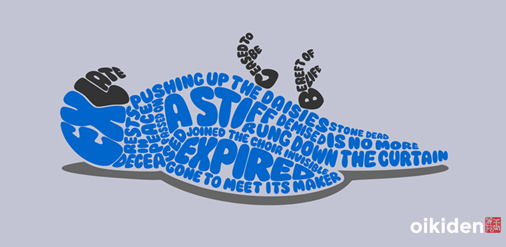
immagine: Oikiden
Molti sketch dei Monty Python fanno parte delle conoscenze enciclopediche degli inglesi.
Tutti conoscono l’episodio del pappagallo morto, ambientato in un negozio di animali, in cui John Cleese interpreta un cliente che protesta perché gli è stato venduto un pappagallo, un Norwegian Blue, che era già defunto. Il negoziante, contro ogni evidenza, nega che il pappagallo sia davvero morto, ad esempio insiste che sta riposando (resting) e poi che si sta struggendo [per la nostalgia] dei fiordi (pining for the fjords). Cleese, sempre più esasperato, snocciola una serie di modi di dire per descrivere la morte (expire, kick the bucket, push up the daisies, be bereft of life, be a stiff, meet the maker, be no more, cease to be, ring down the curtain, join the choir invisible…).
Lo sketch è andato in onda per la prima volta nel 1969, ha una sua voce nel dizionario OALD e appare spesso nelle discussioni su sinonimi ed eufemismi, come in due articoli recenti, This police horse is no more. It has ceased to be. It’s expired and gone to meet its maker (Mind your language – The Guardian) e “This parrot is no more”. When is a synonym not a synonym? (Macmillan Dictionary).
Trascrizione dello sketch qui.
Aggiornamento settembre 2014 – Anche David Crystal in A thousand words for death prende spunto dallo sketch e aggiunge esempi letterari e da classi sociali e registri diversi.
Aggiornamento gennaio 2019 – Lo sketch ha già 50 anni ma le sue battute continuano ad essere riconoscibilissime. Ad esempio, ha ispirato questa vignetta sull’accordo per la Brexit negoziato da Theresa May con l’Unione europea e bocciato dal Parlamento britannico (eppure May ha dichiarato che intende ripresentarlo): 
Vignetta: Dave Whamond

erremme:
Esempio divertente. I Monty Python attingono alla retorica classica che rielaborano. La ripetizione di enunciati equivalenti è un esempio di commoratio.
Rose:
Interessanti le origini scaramantiche di questi eufemismi, come da:
http://www.multilingualarchive.com/ma/enwiki/en/Euphemism
The English language contains numerous euphemisms related to dying, death, burial, and the people and places which deal with death. The practice of using euphemisms for death is likely to have originated with the magical belief that to speak the word “death” was to invite death; where to “draw Death’s attention” is the ultimate bad fortune—a common theory holds that death is a taboo subject in most English-speaking cultures for precisely this reason. It may be said that one is not dying, but fading quickly because the end is near. People who have died are referred to as having passed away or passed or departed. Deceased is a euphemism for “dead”, and sometimes the deceased is said to have gone to a better place…
… euphemisms and dysphemisms for death tend to be quite colorful, and someone who has died is said to have passed away, passed on, checked out, bit the big one, kicked the bucket, bitten the dust, popped their clogs, pegged it, carked it, turned their toes up, bought the farm (comes from the G.I. Insurance Policy as the amount of money the next of kin would receive was enough to buy a farm)., cashed in their chips, croaked, given up the ghost (originally a more respectful term, cf. the death of Jesus as translated in the King James Version of the Bible Mark 15:37), gone south, gone west, shuffled off this mortal coil (from William Shakespeare’s Hamlet), Run down the curtain and joined the Choir Invisible, or assumed room temperature (actually a dysphemism in use among mortuary technicians). When buried, they may be said to be pushing up daisies, sleeping the big sleep, taking a dirt nap, checking out the grass from underneath or six feet under. There are hundreds of such expressions in use. (Old Burma-Shave jingle: “If daisies are your favorite flower, keep pushin’ up those miles per hour!”) In Edwin Muir’s ‘The Horses’ a euphemism is used to show the elimination of the human race ‘The seven days war that put the world to sleep.’
Scusate il lungo copia/incolla. E ora, un bel sorriso, scaramantico. 😀
Licia:
@erremme e @Rose: grazie per il contributo!
Nautilus:
A questo giro non porto contributi, ma ci tenevo a dire che se fossi un insegnante di Inglese con un video del genere ci farei una divertentissima lezione di almeno un paio d’ore. Brano molto istruttivo. Delle espressioni citate non conoscevo “to be pushing up the daisies” che trovo stupenda e, per il cambio di prospettiva introdotto, davvero fine.